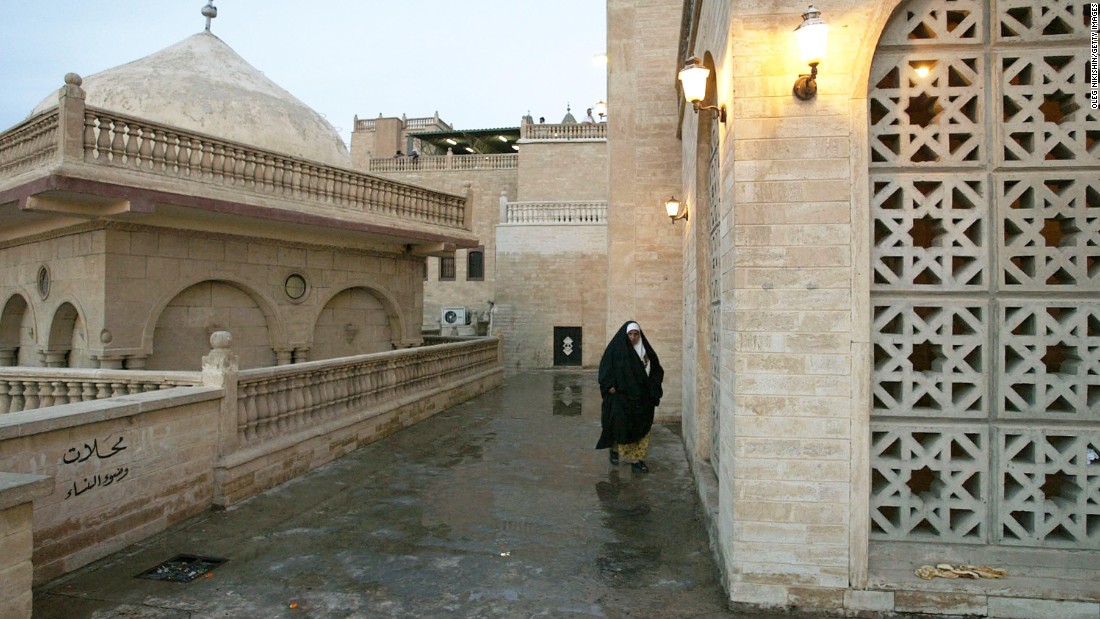Voices from Mosul: 'We want life back to normal'
But the people of Mosul have largely been cut off from the world since the militant group seized the city in June 2014 -- mobile phones are banned and being seen with one can result in medieval-style punishment.
Many are scared to stay as the offensive nears the city, but they are equally scared to run, with no clear safe way out.
More than 1 million residents still trapped in Mosul. Six of them bravely spoke to CNN.
Their names have been changed for their safety.
A Muslim Shiite Iraqi woman walks pass a shop in Mosul in 2004, long before ISIS took the city.
A Muslim Shiite Iraqi woman walks pass a shop in Mosul in 2004, long before ISIS took the city.
Abu Ahmed
When Abu Ahmed heard of a recent attack in Mosul, he and his family left the city's east, fleeing to the west, where things feel marginally safer.
After leaving behind a kiosk that he ran, Ahmed and his wife are struggling to get by with prices skyrocketing in recent weeks.
Of his four children, it is his daughter he is most worried about -- ISIS militants often pressure families in Mosul to marry off their young daughters to fighters.
"First, I am afraid of ISIS. I have an 11-year-old daughter and I worry they will take her," he says.
"Second, I am scared of the Peshmerga because they may ask me why I didn't leave ISIS-controlled areas and flee to Kurdistan.
"Third, I am afraid because I am Sunni and the Shiite may retaliate against me."
Boys enjoy a swim in 2003, when Mosul residents were free from ISIS rule.
Boys enjoy a swim in 2003, when Mosul residents were free from ISIS rule.
Mostafa
"We just want life to go back to normal in Mosul. We want our children to go back to school and we want a life that suits us," says 24-year-old Mostafa, who has a husband and five children.
"We want people to go back to work. Some have not had a job for two years. But the most important thing for me is to get rid of ISIS and the terrorists. We are just looking for security for ourselves and our children."
Many families in Mosul have been unemployed since ISIS took the city.
Several people who spoke to CNN described the financial hardship and the strain it has brought to family life.
An Iraqi woman walks near the mosque of the Prophet Usuf in October 2002.
An Iraqi woman walks near the mosque of the Prophet Usuf in October 2002.
Haja Fawzy
"I just want to see my children before I die," says Haja Fawzy, a woman in her 70s.
She has two sons in the Iraqi security forces who were pushed out when ISIS took control of Mosul. She has not seen them since. Now she lives with her sons' wives and children.
"I am an old woman and I have illnesses I am scared death will come and I miss my children," she said in a flood of tears, unable to continue speaking.
Falah
An ex-policeman, Falah had two choices when ISIS came -- work with us or flee.
He chose to work with ISIS as an employee of their bureaucracy, and says he isn't scared of the shelling, but his wife and child are very afraid.
"I don't want ISIS to remain in Mosul," the 40-year-old says, but he is afraid that he may be considered a traitor and jailed if he leaves Mosul. He sold his police gun when he was short of money, which he is worried about.
"If I am jailed they will ask me what have you done in this time period? And I am so worried about this."
"If the government comes back I will go to jail and who will care for my family and children?"
Traffic from Mosul queues at a Kurdish check point on June 14, 2014 in Kalak, Iraq.
Traffic from Mosul queues at a Kurdish check point on June 14, 2014 in Kalak, Iraq.
Om Emad
"We are waiting for God to save us because we are tired," says Om Emad a mother in her 20s.
"We are happy with the liberation operations but we want them to happen faster!"
She says people in Mosul are praying for their lives to return to normal.
"We hate the way our lives are now," she says, in a determined voice.
We hate the way our lives are now.
"We want our husbands to return to work. We want our children to return to school. I refused to send my children to school after ISIS took over because I fear the radical curriculum they have imposed."
ISIS changed school curricula and books to push their ideology on the youngest in Mosul, residents say, in what they see as an attempt to brainwash the young.
"It has been two years since my son went to school. This means he has lost two years of his life."
ISIS fighters parade down a main road in Mosul in 2014.
ISIS fighters parade down a main road in Mosul in 2014.
Hajja Om Saleh
"I have not seen my sons and some of my grandchildren for two years. I see the pictures of my grandchildren and I see how much they have grown. I pray to God that he will give me enough years of life to see my grandchildren again," says Hajja Om Saleh, an elderly woman.
"My home is so sad and dark without my family."
Some of Hajja Om Saleh's grandchildren live outside of Mosul, but they have been unable to visit, and she has been trapped in the city since ISIS came two years ago, unable to even visit family.
"We want the killing and destruction to stop so that people can return to their homes and life can return to normal."
News Courtesy: www.cnn.com











